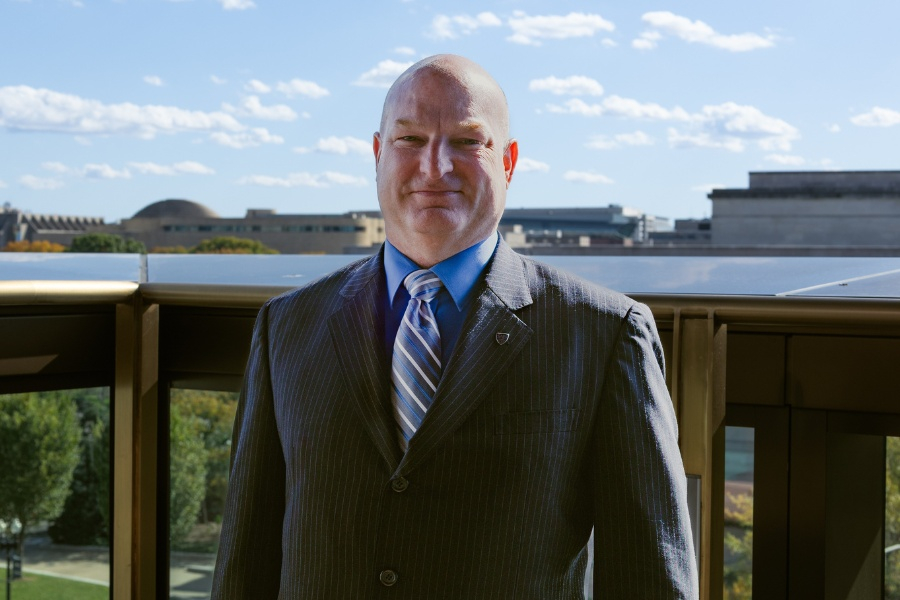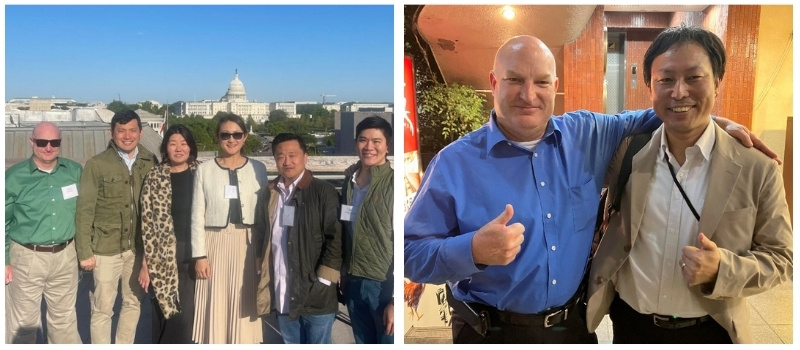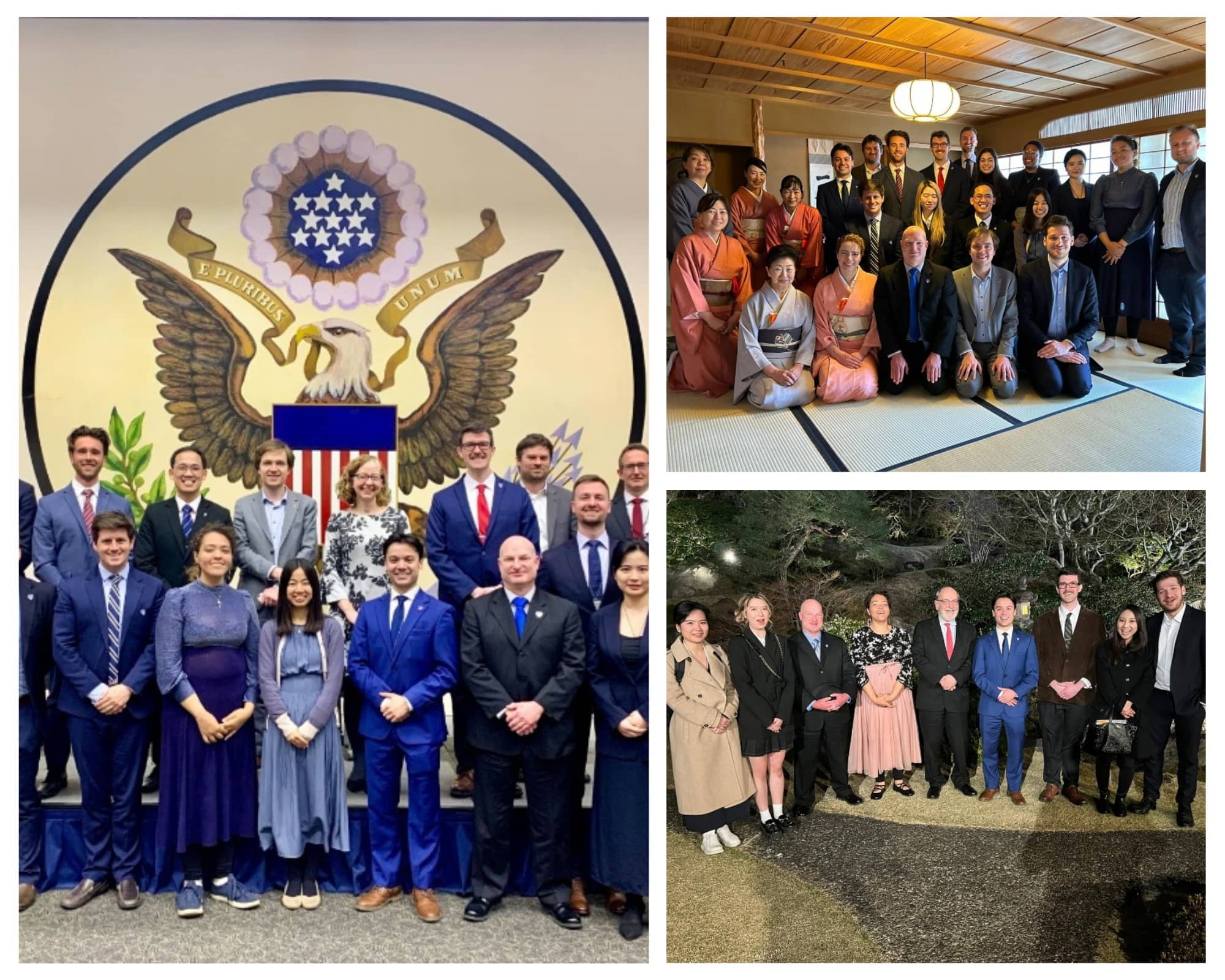It’s About Relationships, Always

Name: Shawn Harding
Home Country: United States
Degree: Doctor of International Affairs (DIA) and Master of International Public Policy (MIPP)
You earned two degrees from Johns Hopkins SAIS—a Master of International Public Policy in 2023, and a Doctor of International Affairs in 2025. Before coming to SAIS, what were you doing?
I was a security cooperation program manager at the F-35 Joint Program Office in Arlington, Virginia, managing Foreign Military Sales (FMS) programs. Specifically, I managed the air vehicle production contract on behalf of 12 FMS customers, ensuring that their requirements were met by the contract and resolving production-related issues. I kept this job for three years while pursuing both my MIPP and DIA degrees at SAIS. It was challenging to work a full-time job while pursuing these degrees. Most of the members of my DIA cohort were also working full-time jobs, so this has become common now that SAIS offers part-time enrollment in these programs.For me, the relationships that I built while studying at SAIS are just as important as the degrees. It’s about relationships, always.
What led you to Johns Hopkins SAIS?
I first learned about SAIS while conducting undergraduate research on the reversion of Okinawa to Japan. Professor Wakaizumi Kei, Prime Minister Eisaku Satō’s special envoy who negotiated the details of the reversion agreement with Henry Kissinger, was previously a student at SAIS. During his year of study at the school, he built important relationships with Americans in the foreign affairs community and continued nurturing that network of professionals in subsequent years. Those relationships would prove essential to the success of not only that and other landmark bilateral agreements, but also in fostering deeper understanding and cooperation between the United States and Japan. Throughout my research and study, SAIS frequently emerged as an important center for not just advanced scholarship, but also for building those personal bonds that form the sinews of so many diplomatic relationships around the world.For me, the relationships that I built while studying at SAIS are just as important as the degrees. It’s about relationships, always.

Caption 1: Members of my DIA cohort | Caption 2: With my MIPP classmate and good friend, Koji Sonoda, while visiting him in Tokyo
What has been your favorite experience at SAIS and why?
My most memorable experience was a week-long study trip to Tokyo as part of the capstone course, U.S.-Japan Relations in Global Context. We participated in several cultural events, such as a Japanese tea ceremony, and visited cultural landmarks. Yet, for me, the best part of the trip was interviewing academics, government officials, and experts on bilateral security issues as part of a research paper on military bases in Japan. It proved to be a great opportunity to build relationships with those brilliant individuals. During that trip, I knew I had found my calling. In between Interviews, I kept thinking to myself, “This is what I am meant to do.” This research trip became a model for several subsequent trips to Japan. I have continued to nurture and build upon those relationships formed during that first study trip.
Caption 1: Briefing at U.S. Embassy, Tokyo | Caption 2: Tea Ceremony | Caption 3: Garden at the International House of Japan
Where do you see yourself in the next five to 10 years?
My life’s work is in support of the U.S.-Japan alliance. I had a 25-year career in the U.S. government, serving first as an active-duty Marine for nine years, and then as a Department of Defense civilian. Recently, opportunities in the U.S. government have become quite limited for international relations professionals. I have a strong background in defense aerospace and may leverage that experience to find a job in the private sector. I do intend to continue my affiliations with the Sasakawa Peace Foundation USA and the Edwin O. Reischauer Center for East Asian Studies at SAIS. I’m also revising my doctoral dissertation for publication as a book. So, regardless of my day job, I intend to continue my studies and research aimed at strengthening the U.S.-Japan alliance. That is my passion and my calling.What is one piece of advice you would give to students in the process of choosing graduate schools?
Prospective graduate students must have a good idea of what they want to do with their career, where they want to go. A graduate school should match up well with a student’s aspirations. SAIS is a school for policy practitioners, those who go out and do. My advice is to research the backgrounds of faculty members. Did they spend their entire career in academia, or did they hold positions outside of academia as practitioners? SAIS has a great mix of both, but the curriculum is geared towards becoming a practitioner. That is the most important reason why I chose SAIS. I wanted to conduct research that is useful to those doing work in the “real world,” not research that will only be read and debated by other academics. SAIS is focused on creating policy-relevant research that is useful to those both inside and outside academia.The best way to do this while still a student is to write class papers that can be published with minimal revision. You must write those assignments anyway, so why not put in the extra effort to get more out of them? Everything I published during my four years at SAIS began as a class paper or research project. Don’t make the mistake of walking away from SAIS with only a degree in your hand. In the world that you will soon enter, having an advanced degree is not enough. You must have something more to show for your time at SAIS.
What was one of the things you learned during your time at SAIS that transformed your perspective or way of thinking?
Research and study for its own sake may be personally rewarding, but if it is not applicable to real-world problems, then it is not very useful. Everything you produce must answer the question: So what? At SAIS, I learned that my research must have meaning and practical use in the world outside the academic institution.If you are looking to learn more about what it's like to be a current student at Johns Hopkins SAIS, we encourage you to schedule a virtual appointment with one of our Admissions Fellows.
Enjoyed reading Shawn's experience? Learn more about our Doctor of International Affairs (DIA) and Master of International Public Policy (MIPP).